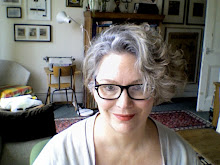framed on a Saturday

"One day we'll get out of here, Wanda"
Today isn't a day in which your Baroque correspondent looked at a newspaper, or kept abreast in any other way with current affairs. She did go to a dinner party, and admittedly in the home of someone pretty high-powered in domestic affairs, but aside from her sparkling anecdotes about Ted Hughes' letters, and Charles Lamb and his mad sister, the thing did not stray far into the Public Good. I guess there was some talk of Michael Portillo.
The main thing Ms B did today, beside getting her roots done (and not before time) was to take eleven - count 'em - pictures to the framers'. Got it? That's an Ikea sofa. A week somewhere hot. A week, in fact, of pay. Eight lots of getting your roots done. But the pictures are largely sentimental in some form or another. And they're also great, in the sense of being good, and are going to look lovely, and it means that the Mansions of Baroque will once again settle down into a state of balance, of being as they should be. It is very hard to settle in a place without things on the walls, and that is all there is to it. Some of these pictures have been waiting years. Some of course, have just come from le palais du Duc, and were getting brown and foxed in bad mounts. Some are amusing French nursery pieces from c1900, and some are original abstract ink drawings etc. which were getting increasingly - no matter what care take in the domestic environment - wrecked. Some are kitsch, and some ineffable. One is an engraving of a monk looking lasciviously down the bodice of a lady, and it will shortly have a dark red lacquered frame which I think highly suitable. The frames I chose are a mixture. Most of the pictures I got either for free or for a pittance (eg the monk, 50p at the William Patten school fair). They will all be ready next Friday. Whereupon I will expire.
But did I replace the wrong printer ink with the right printer ink? So can I print out all this work I'm doing? No. Because I barely had time to rush back to get my roots done. Well, never mind. And thank God for the dinner party, because back here we're on porridge.
Let's see. Other than that, a Ruth Fainlight poem which I hope to have time to write about on the morrow, evoking a trail of feminine literary history akin to the Kiss that goes back generations. Nearly finished work on our interview, which I only conducted a year ago yesterday - which is clearly nothing in some scales of time. I mean, a species of dinosaur would hardly have had time to reach land! I wonder if 'Selena Dreamy' really thinks I have no scope?
By the way. Some weeks ago, out of sensitivity to the issue, I unpublished my post about Stoke Newington School maybe giving some of their Christmas show proceeds to the fund which had been set up for the parents of Etem Celebi, the boy who had been through school with my kids, who was killed. Well, I heard tonight at dinner that the teacher I wrote to has been mocking, or is it complaining about, this email she has received. AND in hearing of the kids! Because that's where I heard it! - although in two months she has not, unfortunately, found the leisure actually to respond. And she was a teacher I liked, though I was well aware that she had also said things to the kids that I thought were inappropriate. Well, I guess I'll take it a bit bigger.
















